On March 26, 2017, Russians took to the streets in anti-governments rallies, organized by opposition politician Alexey Navalny, who recently announced his candidacy for the 2018 presidential elections. The demonstrations marked the 17th anniversary of Russian President Vladimir Putin's rise to power on March 26, 2000. The demonstrators were protesting corruption in Russia, following Navalny's investigation into Russian Prime-Minister Dmitry Medvedev extensive property holdings.[1] The unauthorized protests were held in 87 cities across the country. St. Petersburg and Moscow were the focal cities of the peaceful protests. The police estimated that those participating in the Moscow rally alone numbered 6000-8000.[2] Opposition sources insist that scores of thousands were at the march.[3] The Russian media outlet Gazeta.ru reported that many young people, who have never witnessed a change in power previously, participated to the protests.[4]
According to Gazeta.ru, some radicals had infiltrated the peaceful protest, and this provoked the police to start arresting the protest participants.[5] Hundreds of demonstrators were detained in the Russian capital. According to independent media sources, the police brutally beat protesters on the ground with the use of batons, and detained them indiscriminately.[6] Navalny himself was detained within the first 15 minutes of the Moscow march. On March 27, Moscow’s Tverskoy court imposed a 15-day jail sentence on Navalny for resisting while being detained at an unauthorized rally. Earlier, Navalny had also been fined 20,000 rubles ($350).[7]
Commenting on the protests, Russian Presidential Spokesman Dmitry Peskov said: "The Kremlin respects the people’s civil position and their right to express it. But we respect it when civil activism is expressed in accordance with the law and in places where the law prescribes."[8]
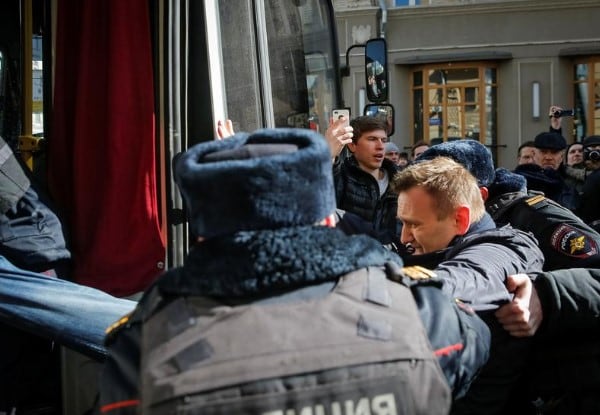
Navalny is arrested by the police. (Source: Themoscowtimes.com)
Information Blackout
The independent news website Meduza.io monitored coverage of the protests by the major Russian news agencies, news websites and other media, such as radio stations. According to Meduza.io, the first two hours of protest activities and the first detentions went "unnoticed" by the major agencies. According to Meduza.io, the two Russian state-run agencies, TASS and RIA, either completely neglected to cover the story or sufficed with scarce references to it. Lenta.ru, Gazeta.ru, and Rambler News service did not refer to the protests as the day's lead story, but published brief articles in the general news section, while devoting the central headlines to international news. The pro-government Life.ru and Izvestia also did not treat the protests as major news, and preferred to concentrate on the Eurovision song contest, concerts etc. Major tabloids also dismissed the story, as did all the TV channels, with the exception of the independent "TV-Rain" internet channel.[9] The information about the protests began filtering through only 3 to 5 hours after the activities had started.
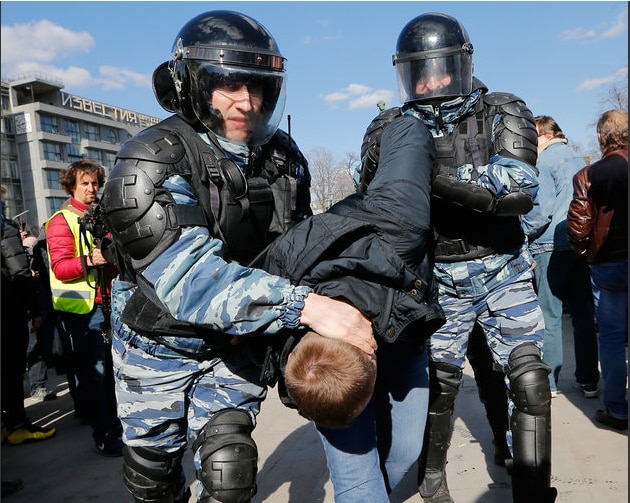
(Source: Gazeta.ru)
Russian Youth As A New Political Force
Gazeta.ru reported that many young people, even school children, participated in the rallies. According to the media outlet, hitherto Russian youth were dismissed as a political force. The Russian authorities neglected the new Russian generation due to their general perception that the Russian youth were apathetic about politics, abstained from participation in the political process and were generally content with their life styles.[10]
On March 27, the presidential spokesperson Dmitry Peskov commented on the protests, saying that according to the "facts at Kremlin's disposal" the youngsters, who participated in the protests were promised a financial reward in case they were detained or arrested. Peskov did not specify, who precisely, had promised the youngsters such a reward.[11]

(Source: Twitter.com/antonsemakin)
Meduza.io mentioned that one of the "most memorable" moments of the March 26 protests was the speech delivered by fifth-grader Gleb Tokmakov, stressing the need to change Russia’s Constitution and the Criminal Code. The following is the transcript of Tokmakov's speech, as provided by Meduza.io:[12]
- "Good afternoon. My name is Gleb Tokmakov. I am a fifth-grader. [Today,], we have seen gathered almost all the people who are engaged in the fight against corruption; people [who work] for newspapers; people who study at [academic] institutions, at universities. Basically, I wanted to make a proposal. If you criticize, then you should propose. Someone said: 'The rule is of millions, not of millionaires.' Yes, this is a good slogan. I agree with it. But in a huge country, the rule of the people is impossible. Everyone wants something of his own. Everyone wants something of his own. Accordingly, it does not matter who is in power: whether it is Navalny or Putin ..."
- "It is important!"
- "Well, no, it is not important. The important thing is to change the system of power itself, [to change] the education system, [to change] the healthcare system. I study at school and I am surprised that schools are so politicized. At school, if you do not draw some picture about our government, they could give you [a low grade]! It should not be this way.
"We have corrupt officials, who ... The Constitution should, in essence, work for us and not for them. Why is it that in our country the Constitution stands against the Criminal Code [and] the Legal Code? It is necessary to change the Constitution alongside the Criminal Code! That is all."
- "Bravo!"

(Source: video)
Ducks And Sneakers
The featured protest symbols were rubber ducks and sneakers. They referenced Navalny's corruption investigation of Medvedev that reported on the prime minister's predilection for expensive sneakers, and that his dacha in Plyos, Russia, has a special home for ducks.
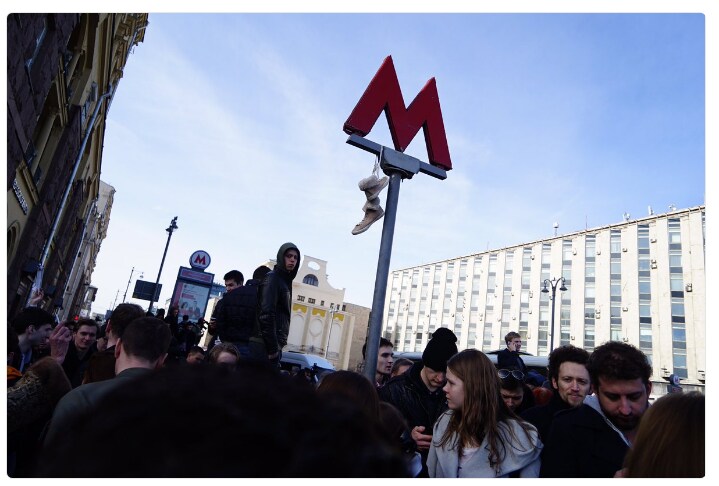
Sneakers hung on the metro's pole (Source: Twitter.com/aban_in)
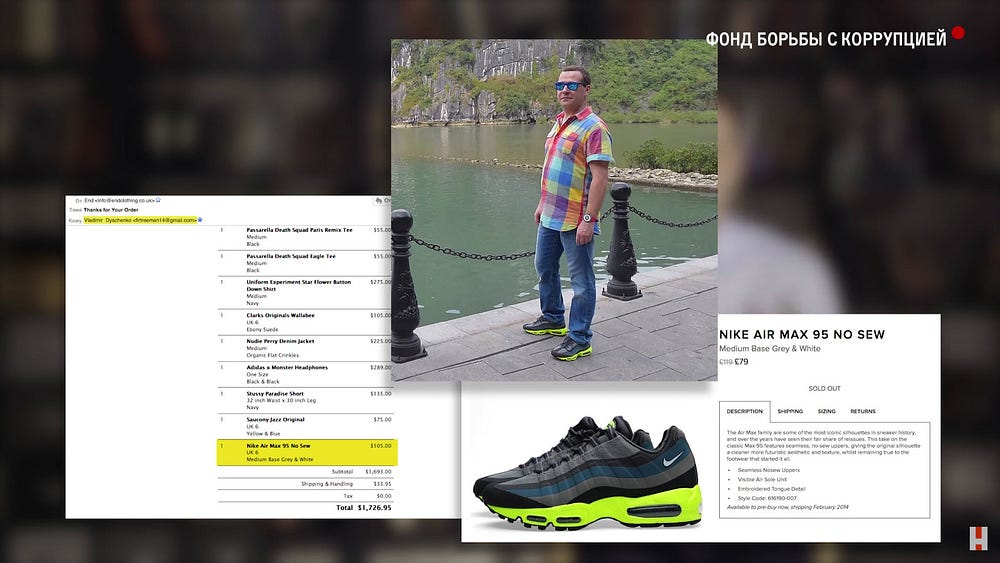
(Source: Navalny's video)
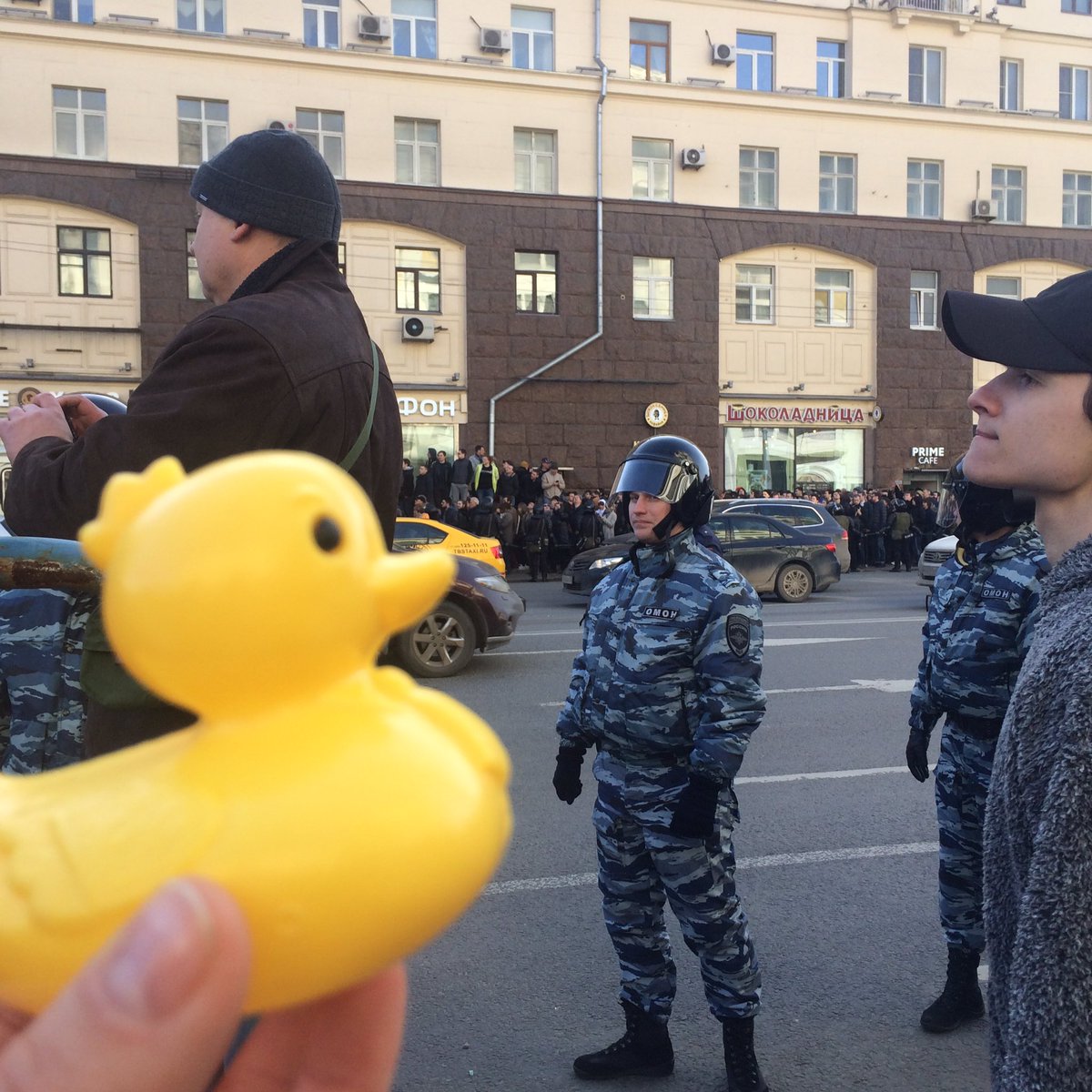
(Source: Twitter.com/aban_in)
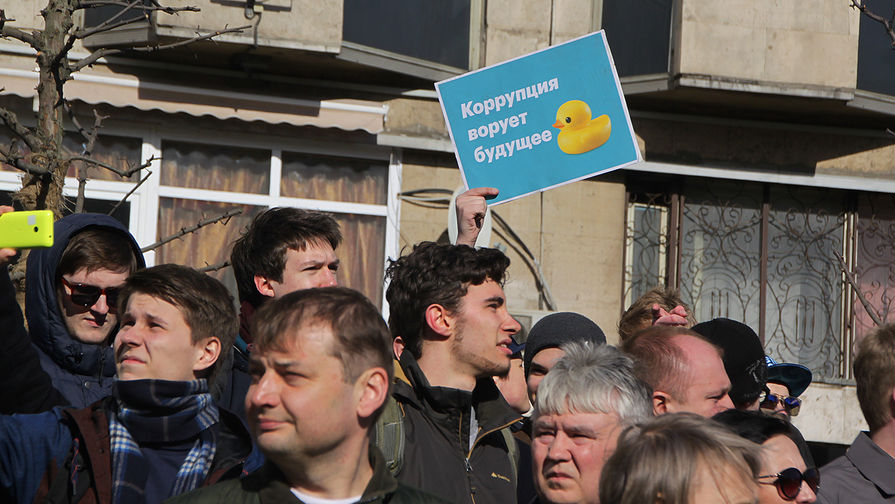
Caption: "Corruption steals from the future" (Source: Gazeta.ru)
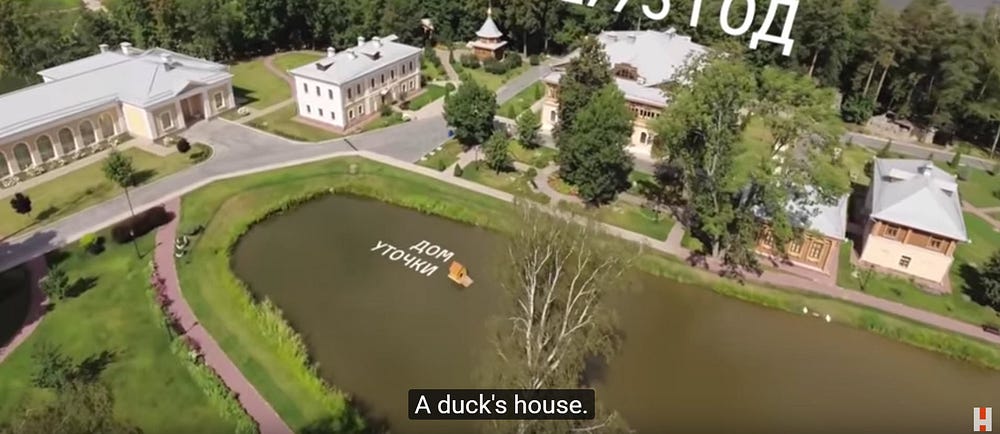
(Source: Navalny's video)
Russian Columnist: Russians Stopped Being Afraid
Echo Moscow distinguished itself by published the blogs of protests supporters. The highly regarded Russian journalist Arkady Dubnov, whose blog is hosted by Echo Moscow, wrote that the rallies proved that Russians were no longer intimidated by the authorities: "I have admiration for the fact that people stopped being afraid and no longer conceal their fastidious contempt for the authorities, who cowardly and cravenly keep silent about the corruption accusations against the top figures. There is a strong feeling that the country is under occupation. The authorities are the occupiers."[13]

(Source: Twitter.com/Alexey__Kovalev)
Russian Analyst: The Kremlin Is Losing Strategically
According to an editorial in Vedomosti the protests cannot be explained by Medvedev being an unpopular figure or the popularity of the anti-corruption slogans. Navalny's investigation was just the last straw. According to Vedomosti, people are unhappy with the authorities. "The protest actions which took place on Sunday in dozens or Russian cities display a high level of dissatisfaction with the authorities, the politicization amongst the new young audience and possibly the faultiness of the sociological prognoses" The political apathy which overcame society after the crackdown on the 2012 protests appears to have ended. The Kremlin has to take this into consideration ahead of the presidential elections particularly as Navalny succeeded in combining his presidential campaign with the protests.[14]
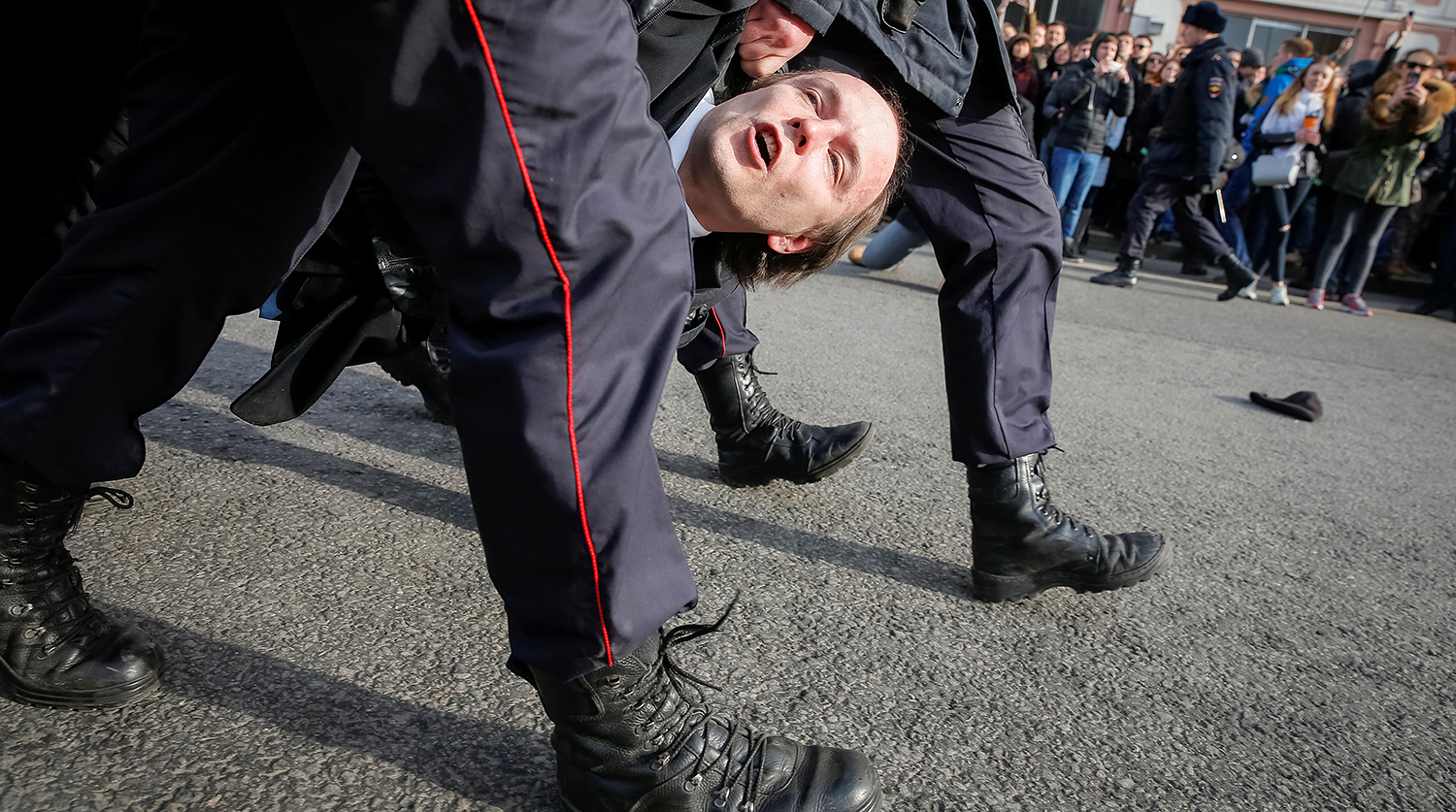
(Source: Gazeta.ru)
According to Professor Alexey Malashenko, of the Dialogue of Civilizations Research Institute, the Kremlin might gain some tactical wins by dispersing the protesters, but strategically the Kremlin is bound to loose "because the question 'who is guilty' will not be removed from the agenda and even if deferred will only be temporarily postponed and no longer till Crimea or till Bashar Assad" Malashenko is skeptical that the discontent can be allayed by the familiar tactic from Soviet times of whisking Medvedev off the stage for presumed health reasons.: "Will everything get immediately better under the next prime minister if he shows-up? It won't get better even if a new 'fresh' president emerges, though his arrival cannot be counted upon."[15]
Senator Klintsevich: 'The Presidential Campaign Has Begun'
In an interview with Echo Moscow, United Russia's Senator Frantz Klintsevich, deputy head of the defense and security committee at the Federation Council, said: "The [presidential] election campaign has begun. It's obvious that the pro-governmental parties, which have the real influence, are under attack at the moment. In order to get the best outcome, they [the opposition] need to hit the leader [Putin]. When it comes to protests – we live in a free country. Everybody has the right to express his opinion, including political activists. This is the way it is and what should be, nothing terrifying. Regarding the protests, probably there are some fair observations insights and critique regarding the government's shortcomings, because there were, are and always will be some shortcoming no matter who is in power. This is the essence of the democratic process – the authorities should always be in the spotlight of the civic opinion. I think we should take that into consideration". Commenting the absence of Medvedev's reactions on Navalny's investigation, the senator said: "As a person who leads the United Russia [party], (Medvedev) should see the shortcomings, take them into consideration… And if there are some – unjustified accusations –it is necessary to respond to them."[16]

(Source: Mk.ru)
FM Lavrov: Western Reactions To The Protests Tainted By Double Standard
Russian Foreign Minister Sergey Lavrov commented that the Western countries’ reaction to the protests was tainted by a double standard. "I proceed from the stance that each country has laws, based among other things on universal criteria, - and in this particular case on the criteria, stipulated by the international convention on civil and political rights - envisaging freedom of speech and the right of assembly as well as exceptions when state security and the moral well-being of society are concerned." He then added: "Before this convention was recognized, one prominent figure said that freedom means abiding by the laws. Therefore, the laws, which are stipulated in the universal international legal tool of sovereign states to impose restrictions on events that may result in mass unrests, form the basis of this freedom that we are discussing."
Commenting on the West's public reaction regarding the protests, Lavrov said: "When events of the same level provoke different reactions all we can think of in this regard is the infamous double standard. I cannot remember, when somebody expressed a strong and public reaction regarding the decisions, recently made in Austria, Holland, Germany, where the authorities banned holding certain protests."
Commenting on the detentions of protesters, Lavrov stated: "Considering the detentions, I remember how in a number of European capitals and in the United States police dealt with such violators. They resorted, inter alia, to the use of batons and tear gas, in case protesters gathered in locations, from which they were banned, and followed unsanctioned routes. Russian journalists were also in such situations, particularly a RT (Russia Today) crew in the United States, where they were detained trying to deliver a report on some sort of protest-related unrest."[17]
[1] See MEMRI Special Dispatch No. 6826, New Navalny Investigation Accuses Medvedev Of Corruption, March 10, 2017.
[2] Tass.com, March 26, 2017.
[3] Gazeta.ru, March 26, 2017.
[4] Gazeta.ru, March 27, 2017.
[5] Gazeta.ru, March 26, 2017.
[6] Echo.msk.ru, March 26, 2017.
[7] Tass.com, March 27, 2017.
[8] Tass.com, March 27, 2017.
[9] Meduza.io, March 26, 2017.
[10] Gazeta.ru, March 27, 2017.
[11] Rbc.ru, March 27, 2017.
[12] Meduza.io, March 27, 2017.
[13] Echo.msk.ru, March 26, 2017.
[14] Vedemosti.ru, March 27, 2017.
[15] Echo.msk.ru, March 26, 2017.
[16] Echo.msk.ru, March 26, 2017.
[17] Tass.com, March 27, 2017.




.jpg)